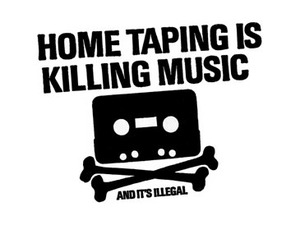Introduction
It seems like only yesterday that we were carrying walkmans to listen to our music. Unaware of little more than battery life and durability, portable music was simple: tune in to the radio, or play a cassette tape. When I got home from a day at school, I would often turn on the radio, cue my latest tape to the first blank section, and eagerly await the playing of my new favourite song. I hoped to catch and preserve it for all eternity on my Maxell 90-minute miracle mix-tape, so that the soothing beats could play through my headphones on my bus ride to school the next morning.Little did I know, I was stepping on the road straight to H-E-double hockey sticks...At the tender age of 9, I was a pirate. Of course, at the age of 9, being a pirate is something that involves an eye patch, your mum's old ruffled blouse that hasn't seen the light of day since 1978, and some form of kitchen utensil as a substitute hook.
My, how times have changed. Now there are laws in place to send little 9-year-olds like I was to jail, and my trusty old walkman has been replaced by a sleek iPod nano. CD burners, Napster, and DeCSS came and went, and now Metallica has a contract to be on Napster's service while DVD Jon is writing protection instead of breaking it. So sit back, and let's take a musical trip through media, content protection, and your rights as the sucker with the dough.
"The style is new, but the face is the same as it was so long ago..." - A little history
In 1969, Led Zeppelin released its second album. Among other greats, it featured a song called "Heartbreaker." Though it was certainly never meant to be taken as such, it would be a great anthem for those of uswho are consumers looking at the media industry now. Record labels have always been at odds with their customer base, but it was never so popular to hate big business as it was when the cassette tape craze started.

Left: The original anti-tape ad. Look closely...you'll see this again.
Right: Bands like Metallica thrived off of taped bootlegs from their concerts, like the one pictured.
When cassette tape recorders started being released to the general public, the recording industry worldwide went into a panic. Surely, nobody who could just record music would buy it?! The existance of tape-trading rings and organized bootleggers seemed to further the industry's point. Suddenly, it was possible to buy a tape of a concert that you didn't even go to, for a band that you didn't pay to see or hear. It was entertainment armageddon...and thus was born the first anti-piracy campaign: "Home taping is killing music."
What the record industries never bothered to mention was that these bootlegged copies of concerts were what made some of the most popular acts of the 80's and 90's. Metallica, the band that would later go on to be a thorn in the side of consumer-rights lovers everywhere, owe most of their career to the existance of bootlegs, which helped them rise up to immense popularity in spite of poor backing by their initial label. Elektra records would never have been capable of pouring enough advertising into the band as they received from word of mouth and bootlegged concert tapes.
Of course, the recording industry isn't the only group that had protection problems. The MPAA was struggling with the advent of Betamax at roughly the same time. Even the software industry had to acknowledge the threat of piracy once disk sizes shrank down to the ever-portable 3.5". The media was no longer ungainly, and computers were nowhere near as scarce. Eager to protect their own rights, the Software Publisher Association created the "Don't copy that floppy" campaign in 1992.

MSI MPG Velox 100R Chassis Review
October 14 2021 | 15:04









Want to comment? Please log in.